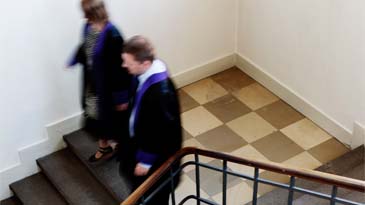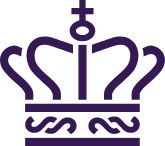Court proceedings
When the prosecution service has submitted a case to the court, it will set a trial time and date for the case to be heard. When the date has been set, the defendant or defendants and witnesses receive a summons to appear in court.
The court hearing during which the case is heard is referred to as the trial proceedings.
In the district court
In the district court, the hearing begins with the prosecutor’s reading out the indictment listing the charges. The defendant then states how he or she pleads. Next, the defendant is examined – first by the prosecutor and then by the defence counsel. The defendant does not have a duty to testify or answer questions in court.
When the defendant has finished testifying, the witnesses are brought into the courtroom – one at a time. The witnesses are usually examined first by the prosecutor and then by the defence.
Any documents with a bearing on the case, such as medical reports or criminal records, are read out by the prosecutor when all witnesses have testified.
Finally, the prosecutor and the defence counsel make their closing arguments in the case. During the closing arguments, the prosecutor and the defence counsel typically begin by addressing the question of guilt – i.e. the arguments for and against the defendant being guilty. The prosecutor and the defence counsel state the penalty they think the defendant should be given if convicted.
When the closing arguments have been delivered, the defendant is given the opportunity to speak.
Subsequently, the judges retire (i.e. leave the courtroom) to consider their verdict. During their deliberations, the judges consider whether the defendant is guilty or not and the punishment to impose if so.
When the judges have finished their deliberations, they return to the courtroom to deliver their verdict. A judgment that cannot be delivered immediately will be reserved, that is, delivered at a later date. The judge will announce the time and date of its delivery.
In the high court
In the high court, the hearing begins with a reading of the district court’s judgment, after which the defendant is examined. The testimony normally begins with a reading of the defendant’s testimony from the district court, after which the prosecutor and defence have the opportunity to ask supplementary questions.
When the defendant has finished testifying, the witnesses are examined. The testimony normally begins with a reading of the witness's testimony from the district court, after which the prosecutor and defence may ask supplementary questions. Witnesses summoned by the prosecutor are first examined by the prosecutor and then cross-examined by the defence. Witnesses summoned by the defence are first examined by the defence counsel and then by the prosecutor.
When the defendant and all witnesses in the case have testified, and the prosecutor has presented all the case documents, the prosecutor and the defence counsel make their closing arguments. The defendant is also given the opportunity to speak.
The judges then retire to consider their verdict. The judgment is normally delivered during the same hearing. If an immediate judgment cannot be delivered, the judge will announce the time and date of its delivery.


